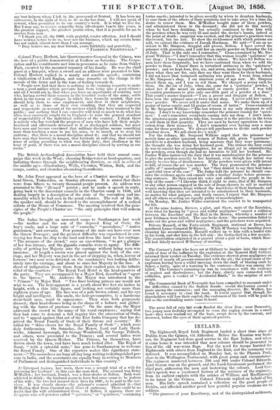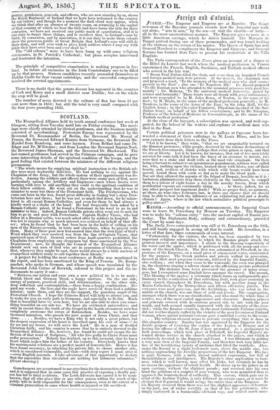IRELAND.
The Eighteenth Royal Irish Regiment landed a short time since at Dublin from the Crimea, via Aldershot. Before the Russian war broke out, the Regiment had done good service in the East Indies, and when it came home it was intended that new colours should be presented in lieu of the old war-worn flags. But the need for troops hurried the Eighteenth with others from England to the East, and the ceremony was deferred. It was accomplished on Monday last, in the Phomix Park, close to the Wellington Testimonial, with great pomp and circumstance. The regiment mustered between 700 and 800 under Colonel Edwards. Lord Seaton was on the ground, and the Lord-Lieutenant performed the chief part, addressing the men and bestowing the colours. Lord Car- lisle's speech was a condensed historyof the services of the regiment, from its earliest exploits with the armies of William and Marlborough to its latest in the Crimea. Colonel Edwards replied on behalf of his men. His little speech contained a reflection on the good people of Dublin, and afforded another proof how grateful popular ovations are to soldiers. "The presence of your Excellency, and of the distinguished noblemen, gentry, gentlemen, generals, and officers, who are now standing by us, shows the Royal Regiment of Ireland that we have been welcomed to the country by our rulers ; and though for a moment the dark cloud may appear, when we think that after an absence of twenty years, on returning to the capital of that country of which we bear the title and have borne the title for three centuries, we have not received any public mark of approbation, still it is our duty to forget these things, and to recollect that, as Ireland's sons by birth, by connexion, and by association it is our duty to make these colours show the generous public of Great Britain that Ireland's sons will still do their duty, and will ever wish to place Irish soldiers where I may say with pride they have ever been and ever shall be." The "old colours" were to have been hung up with some religious ceremonies, in St. Patrick's Cathedral ; but pious scruples intervened and frustrated the intention.
The principle of competitive examination is making progress in Ire- land. In future all vacancies in the Irish Constabulary 'are to be filled up by that process. Sixteen candidates recently presented themselves at Dublin Castle for four vacant cadetships, and the successful competitors received the coveted appointments.
There is no doubt that the potato disease has appeared in the counties of Cork and Kerry and a small district near Dublin ; but on the whole the crop will be good.
The number of acres devoted to the culture of flax has been 11 per cent more than in 1855; but still the total is very small compared with the four years preceding 1855.



























 Previous page
Previous page